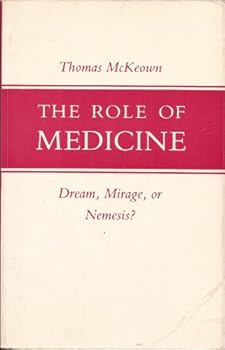The Role of Medicine
Select Format
Select Condition 
Book Overview
In analyzing the factors that have improved health and enhanced longevity during the last three centuries, Thomas McKeown contends that nutritional, environmental, and behavioral changes have been and... This description may be from another edition of this product.
Format:Paperback
Language:English
ISBN:0631112618
ISBN13:9780631112617
Release Date:August 1979
Publisher:Blackwell Publishers
Length:207 Pages
Weight:0.62 lbs.
Customer Reviews
2 ratings
I gave my copy away......
Published by Thriftbooks.com User , 21 years ago
... luckily I took and kept lots of notes. This is an excellent book, and with the data then available to him, McKeown makes a clear and compelling case. Replying to Julie Masis' point, one example did illustrate a before-and-after scenario. In whooping cough the death-rate declined from over 1400 per million children in the 1860's to less than 100 in 1950/51 when immunization became available. On the accompanying graph in the book, there was even a slight rise in the death-rate during the winter of 1950-51, after which the graph resumed its previous trend. The introduction of vaccination did not even speed up the decline in the disease.In measles, the death-rate per million children had already declined from its peaks of over 1200 in the 1860's and around 1890, to virtually nil in 1970, before immunization was introduced.If paying consumers are making informed choices, then there is no problem. If medical, educational and social behaviors are being determined by "myths and dreams" it may help to look at facts.I have not seen a better book on this subject since its publication 25 years ago, nor adequate refutation of its central thesis. If further data exist to modify McKeown's views, let's hope an equally clear and succinct writer presents it for us.
...thoughts summary
Published by Thriftbooks.com User , 23 years ago
In his book The Role of Medicine, Thomas McKeown illustrates (using historical causes of death records from 1848 to 1970 for England and Whales) that the decline in mortality due to infectious disease usually preceded the invention of effective medical methods. The history of tuberculosis provides an especially good example to McKeown's thesis. ...McKewon even concludes (p120) "If a choice must be made, free school meals are more important for the health of poor children than immunization programmes, and both are more effective than hospital beds." !-I am not sure I agree: all McKeown showed is that an improvement in nutrition led to a decrease in infectious disease mortality, i.e. nutrition is important for health. He never compared two populations - one that received improved nutrition and no vaccination, for example, and the other that received vaccination and medicine with no improvement in hygiene and nutrition...






